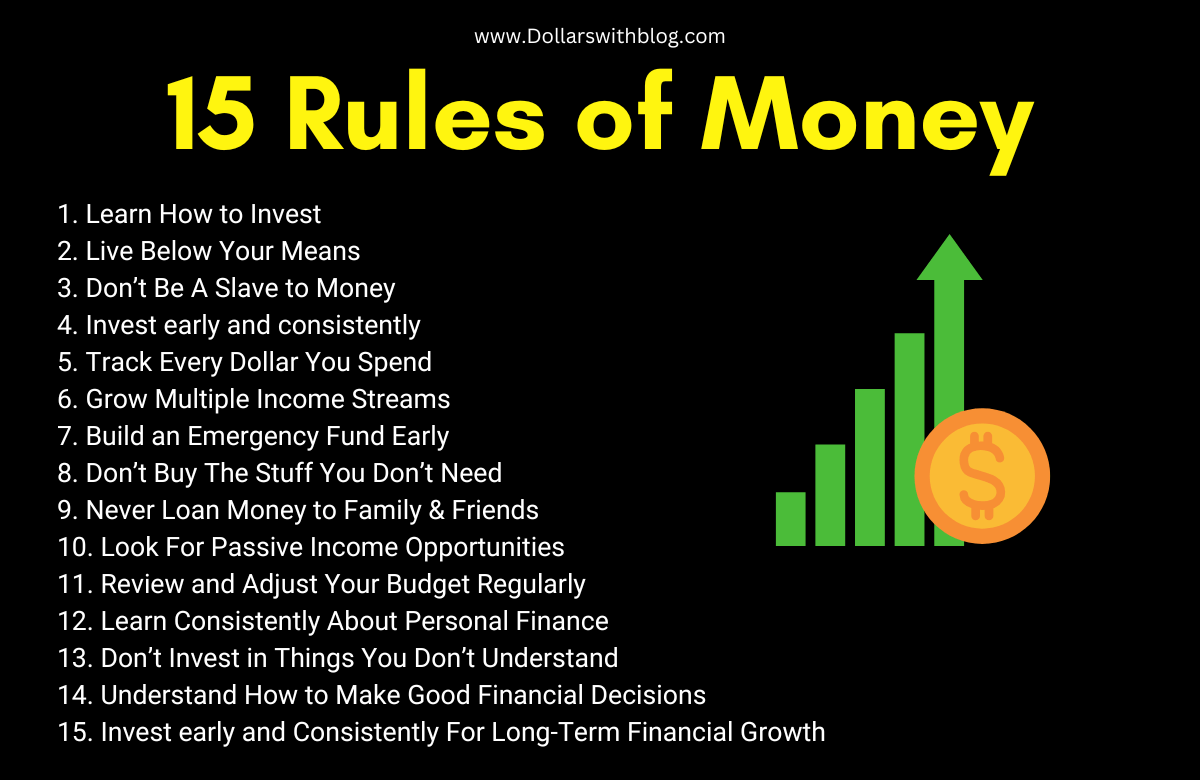15 Rules Of Money Everyone Must Know To Become Rich
Money is a tool, and like any tool, knowing how to use it properly can transform your life. Most people dream of becoming rich but overlook the importance of learning the rules that create wealth.
Becoming financially successful isn’t about luck, it’s about consistent habits, smart decisions, and understanding how money works.
Learning these rules and applying them ruthlessly will help you grow your wealth and achieve financial freedom:
Table of Contents
1. Learn How to Invest
Learning how to invest correctly is an extremely important skill that can make you a ton of money. Right timing & right decision are important in making investment decisions.
If you don’t understand something, then how do you expect to make a good decision about it?
The rule of investing is to grow your wealth consistently over a long time frame. It’s actually amazing how compound growth works when we plan & do something for a very long time instead of the short term.
Other Article: 3 Legal Pages You Need For Your Blog in 2024
2. Live Below Your Means
You’ve been hearing this line for your whole life. But have you tried to understand what this really means? Do you implement and take action? Living below your means doesn’t mean you don’t invest in yourself, don’t go on a holiday with your family, or don’t spend money on partying.
It means to have a clear goal of how much money you want to save & the freedom you want — then consistently taking action for that money goal.
For example, if you want to save $100,000, you need to save $1,000 every month for like 8.3 years. But obviously you can invest and achieve that goal extremely fast.
3. Don’t Be A Slave to Money
It means not letting money control your life. Instead of working endlessly just to earn more money, focus on creating a system/ business where money works for you. Develop multiple income streams.
You have to make, save, and then invest money. And not let the desire for money take away your time or happiness.
4. Invest early and consistently
Instead of starting to invest in your 40s or 50s, start investing as early as you can. If you’re reading this and you’re in your 20s – 30s. I highly suggest you start investing.
If you come across personal finance while in your 20s, consider this a gold mine and golden opportunity where you can consistently invest and reap the fruits of compound growth.
5. Track Every Dollar You Spend
Most people are gonna ignore this rule, but TRUST me this can save you thousands of dollars. Every day you spend money on things you don’t need or want like:
- Fast Food
- Gadget Items
- Coffee Shop Visits
- Excessive Beauty Products
By tracking every dollar you spend, you’ll be able to realize and save that money. Start doing this small activity every day and see your balance grow. It’s important to track and then save that money by controlling yourself.
6. Grow Multiple Income Streams
You need to earn money from more than one source. Instead of relying on just one job or paycheck, you create different ways to make money. In this way, you also save yourself from the risk of getting fired (From Your Job).
This helps you become financially stable and prepared for unexpected situations. YOU WILL HAVE A PEACE OF MIND.
Grow multiple income streams like:
- Investing in stocks or real estate
- Offering online tutoring or coaching
- Starting a blog or YouTube channel
- Renting out unused space or property
- Freelancing (writing, graphic design, etc.)
- Creating and selling digital products (eBooks, courses)
7. Build an Emergency Fund Early
Building an emergency fund early is one of the smartest financial decisions you can make. It’s important to start saving a small amount regularly, even if it’s not much at first.
Save enough to cover three to six months of basic living expenses. This fund acts as a safety net in case of unexpected events like job loss or medical emergencies.
Keep it in a separate account so you don’t use it for everyday expenses. Starting early helps you grow your emergency fund over time, providing you with financial security when you need it most.
8. Don’t Buy The Stuff You Don’t Need
You’ve probably found yourself walking around cafes, suddenly craving a coffee or pastry, or out with friends and spotting a jacket you liked and buying it on the spot. Don’t do that—these habits will keep you broke and make it hard to save money.
This habit can waste money that could be saved or spent on things that actually matter. By focusing on needs over wants, you can save more and make smarter choices with your money.
9. Never Loan Money to Family & Friends
Some people will find this rule offensive. But it’s the truth that 99% of the time you’re not gonna get your money back. Only lend money if you’re okay with not seeing it again.
The first rule is to never give away money. And if you start making good money or your business becomes successful, don’t ever tell anyone. Everyone will come to you for money for a thousand reasons.
10. Look For Passive Income Opportunities
By only doing a job you’re not going to make serious money. You need multiple income streams to build real wealth. Always build passive income streams like:
- Dividend-paying stocks: Invest in stocks that pay regular dividends.
- Rental properties: Earn monthly income by renting out property.
- Side hustles: Find projects that can earn money without needing to work constantly and your attention.
These things will definitely require cash and time, but its worth it and bring in extra cash while you’re busy.
11. Review and Adjust Your Budget Regularly
It’s important to keep an eye on your budget and make adjustments when you need to. Life changes all the time. Bills go up, income shifts and unexpected expenses can come out of nowhere. Sounds Familiar?
Just spending a few minutes each month looking over your spending can help you stay in control. Making small changes here and there helps keep you on track, showing you where you might need to save more or cut back.
12. Learn Consistently About Personal Finance
It doesn’t matter how much you earn, where you live, or who you are. You need to learn about personal finance. The financial literacy rate is extremely low.
To improve your financial situation, start by learning about budgeting, investing, and saving. There’s a famous saying: “Knowledge is power”. It’s soo true!
The more you learn, the better you’ll be able to make smart decisions that’ll help you to grow your wealth and avoid common financial mistakes.
13. Don’t Invest in Things You Don’t Understand
Ever happened to you that you came across a stock you heard from a friend or through great marketing? Don’t ever invest money just because of that! I’m just giving you an example. This applies to everything — crypto, stock, bonds, property, etc.
If you don’t fully understand what you’re investing in, how can you expect to make money from it? It’s pure gambling, not investing. Always do your research before putting your money into something.
14. Understand How to Make Good Financial Decisions
Making good financial decisions is a skill that you can learn with practice and patience. You have to ask yourself two simple questions before making a financial decision every time:
- Do I need this?
- How will it impact my finances?
A good decision always requires deep research. For example, when buying a car or home, look for deals, negotiate prices, and consider long-term costs like maintenance.
Don’t just make a decision based on emotion rather make it based on the provided data. And Remember, every decision shapes your financial future.
15. Invest early and Consistently For Long-Term Financial Growth
The earlier you start, the better your chances of building the wealth. Investing consistently is about creating a habit. Even if you begin with small amounts, they add up over time due to compound growth.
For example, if you invest $200 monthly from your 20s, by your 40s, it can grow into a substantial amount, depending on the returns.
Stick to simple, proven strategies like index funds, ETFs, or retirement accounts. Don’t overcomplicate the process and stay patient.
Conclusion
Money management isn’t just about earning, it’s about making right decisions, building habits, and staying disciplined for a long period of time.
Remember, every small step today leads to big results tomorrow. Start now and take charge of your financial journey!








3 Comments